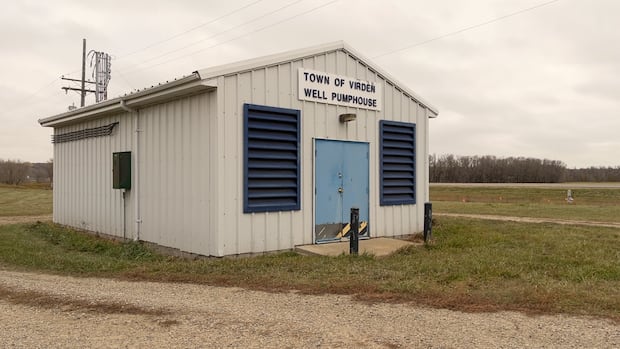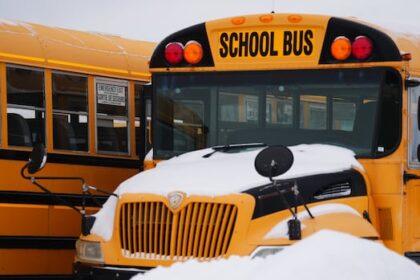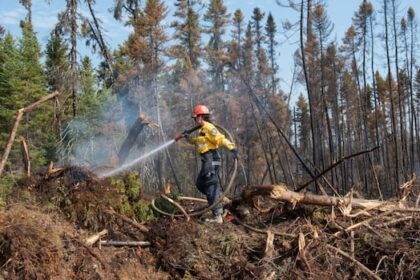ManitobaThe town of Virden is under a water advisory warning after returning to an old water source, which tests indicated had a level of arsenic above drinking water guidelines.Virden had to turn to new water source after hitting ‘seriously low’ levels in aquifer in use since 2021Chelsea Kemp · CBC News · Posted: Oct 30, 2025 6:00 AM EDT | Last Updated: 5 hours agoListen to this articleEstimated 5 minutesThe Town of Virden issued a water advisory on Oct. 19 warning it was returning to its old water source, which past tests found contained levels of arsenic beyond federal guidelines. (Chelsea Kemp/CBC)The town of Virden is under a water advisory warning after returning to an old water source, which tests indicated had a level of arsenic above drinking water guidelines.The southwestern Manitoba town of approximately 3,000 people had to find a new water source after levels in its aquifer, which was tapped into in 2021, became critically low.According to an Oct. 19 advisory posted on the town’s website, two wells being brought online are part of an aquifer “in which previous testing and historical data indicated the levels of arsenic exceeded the Canadian Drinking Water Guideline.”Resident Kathy Heaman said people are frustrated and looking for answers around the town’s water supply.”We need potable water,” said Heaman. “We need to have answers.”She’s seen residents buying bottled water and trying to conserve use, she said.Emergency response measures have been in place since Oct. 10, when people were asked to conserve water due to “seriously low” levels in its aquifer. That led to bringing the new wells, which previously tested high for arsenic, online.On Oct. 24, officials said raw water was again going through full treatment, including reverse osmosis and greensand filtration, but it cautioned its earlier advisory remained in effect.That Oct. 19 advisory warned that drinking water with arsenic exceeding the federal drinking water guideline of 0.01 milligrams per litre over a long period of time can increase cancer risk. It said residents may want to use other sources, such as bottled water, for drinking and cooking, and cautions that boiling the water may increase the concentration of arsenic.WATCH | Virden warns new water supply could contain arsenic:Southwestern Manitoba town warns new water supply could contain arsenicVirden, Man., has tapped an old water source that was previously found to have high arsenic levels, after its newest aquifer dried up. The town, which has a population of about 3,000, issued a drinking water advisory on Oct. 19. A provincial spokesperson told CBC in an email the Manitoba Water Services Board is working with the town to identify an alternative water supply. The best immediate option is using the previous well site, the province said.For now, one pre-existing well is being used while a replacement is drilled, according to the spokesperson. The Environment and Climate Change Ministry and Manitoba Health are overseeing testing and regulations. “This precautionary advisory [in the Oct. 19 advisory] is in place pending testing of arsenic levels in the treated water from the new water source, and provides residents with recommendations and steps they can take to minimize their arsenic exposure,” said the spokesperson.Virden Mayor Tina Williams told CBC in an email the town works with the Manitoba Water Services Board on all water projects.The town has “well trained water and sewer employees,” but not employees who have training with aquifers and groundwater, Williams said.The mayor could not be reached to answer followup questions. The town previously told CBC News the new well may not be a permanent fix.Crisis avoidable, says residentNursery school operator Frances Lansing praised the town for being transparent and diligent in its response, but said she’s long relied on bottled water for children in her care.”I just know like there has been some issues in the past,” she said.Meanwhile, resident Jennifer Ritchie said she got bottled water for her son, who plays hockey, but she’s worried about water contamination.”Cancer has happened in our family, and so I’m very cautious to what we put into our bodies,” she said.John Hipwell said his well ran dry soon after the town began drawing from the shared aquifer in 2021.”We never had any problems” until the town tapped in, he said.John Hipwell says it was clear the aquifer Virden tapped into in 2021 did not have enough water to support the town of more than 3,000. (Chelsea Kemp/CBC)A 2020 water supply study by W.L Gibbons and Associates on the water supply upgrade the town ended up completing in 2021 raised concerns about the long-term sustainability of groundwater withdrawals, he said. After the town’s well came online, his water level dropped by nearly a metre in three months and eventually went dry, he said.By January 2024, Hipwell said he had to haul water before he dug a new well at a different spot in the aquifer in May, at a cost of $40,000. He believes the town’s withdrawals are outpacing natural recharge.”When they stop taking the water out, I assume the aquifer will slowly start recharging,” Hipwell said.He questions why the town tapped into the aquifer in 2021 in the first place.”They’ve wasted millions [of dollars],” he said. “There’s a pipeline that goes from the new wells to Virden. It’s of no use.” Hipwell says the town needs to take water conservation and quality more seriously.”I get the impression for as long as water comes out the tap, everything is good,” Hipwell said.”The town should have put a hose pipe ban on, a sprinkler ban, a ban on washing cars — that should have been back in the beginning of this year.”Mayor Williams said the town met with Hippwell and a neighbour.”Plans were made surrounding low supply and we are all staying in contact,” her email said.ABOUT THE AUTHORChelsea Kemp is a multimedia journalist with CBC Manitoba. She is based in CBC’s bureau in Brandon, covering stories focused on rural Manitoba. Share your story ideas, tips and feedback with chelsea.kemp@cbc.ca.
Wednesday, 4 Feb 2026
Canada – The Illusion
Search
Have an existing account?
Sign In
© 2022 Foxiz News Network. Ruby Design Company. All Rights Reserved.
You May also Like
- More News:
- history
- Standing Bear Network
- John Gonzalez
- ᐊᔭᐦᑊ ayahp — It happened
- Creation
- Beneath the Water
- Olympic gold medal
- Jim Thorpe
- type O blood
- the bringer of life
- Raven
- Wás’agi
- NoiseCat
- 'Sugarcane'
- The rivers still sing
- ᑲᓂᐸᐏᐟ ᒪᐢᑿ
- ᐅᑳᐤ okâw — We remember
- ᐊᓂᓈᐯᐃᐧᐣ aninâpêwin — Truth
- This is what it means to be human.
- Nokoma











